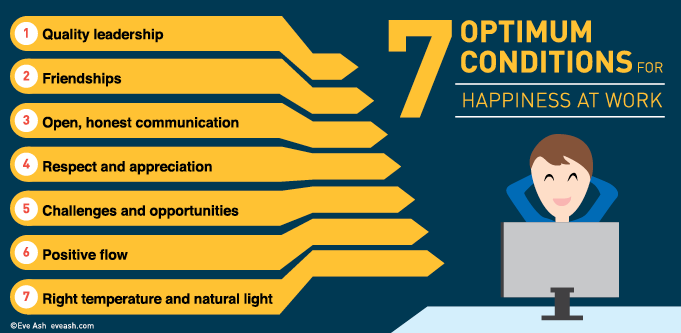Are you happy at work? Do you look forward to Mondays? How do you feel returning from vacation — refreshed and ready to get back into work, or disappointed you had to come back. It’s important that work and our workplace gives us contentment. But what are the optimum conditions and indicators of genuine contentment in a workplace?
1. Quality leadership
Most of all, contented staff are that way because they like and respect their leaders. Good leaders set healthy parameters and expectations and these make a huge difference to people’s attitude to their work. They are supportive of their people and caring of their needs and career choices. They are inspiring, sincere, and definitely ‘do the do’ (and don’t just talk about it). They know what they’re on about, and are usually excellent communicators. They lead, providing direction in a receptive, facilitative fashion. They are the purr of a Rolls Royce; so well put together you can barely hear the engine as the car glides smoothly along the road. That’s quality. That’s a contented workplace.
2. Friendships
Everyone needs at least one ally in the workplace. The intensity and time spent on/at work frequently requires someone with whom you can debrief and exchange pertinent advice. A friendly face also makes a big difference; not mindlessly or ingratiatingly smiling all the time, but a genuine supportive reaction, subtly expressed, tells you that you didn’t overstep the mark when you candidly assessed a situation or when others were piling in on you during a meeting.
A friend is also the person who you can rely on to be honest, discreet and constructive when your behaviour or workplace performance is below par. There needs to be that someone you enjoy having a coffee break or lunch with, someone who genuinely catches up after a weekend. You don’t necessarily have to socialise with such people after hours, but they’re your friends in the truest sense of the word.
3. Open, honest communication
It’s not always your friends and allies you should prize above else. A colleague or manager who is open and honest is likewise worth her/his weight in gold. A secretive office atmosphere where no-one talks much and where the only open thing going on is people’s pursuit of their own agendas spells D-Y-S-F-U-N-C-T-I-O-N-A-L. It’s far better that there’s honesty and transparency in the communications mix, even if it stings a little. You know where you stand and that’s a good, reliable indicator. And you can know what lies ahead so can be better prepared.
4. Respect and appreciation
We often have different opinions and ideas, and if others respect you and what you have to say, it feels good. We’ve all worked with thorny individuals who can be abrasive and downright rude. Most of us have worked with a few and suffered or seen others suffering. They are brilliant at generating stress and division among people. The behaviour invariably stems from a lack of respect or appreciation for other people’s opinions and not even the good grace to listen. A seasoned skilful manager recognises the damage such people can cause, and diverts those people’s energies elsewhere. They also know how to handle them gracefully but firmly, when necessary.
5. Challenges and opportunities
Most of us really enjoy it when we can get our teeth into something. This is especially so when you’ve been flat-lining in your workplace and things are a little dull. It’s amazing how one’s energies surge in response to a new role, new responsibilities, a change of scene, a project that has to be done (with the potential to make an impact) and especially a chance to make a difference.
Happy workplaces recognise the importance of goals as well as giving back in some way; they participate in charity work, mentor people who would otherwise never have had the opportunity to be there, and so on. See, too, if you can pursue challenges and opportunities — keep an eye on the various grapevines around and don’t just wait until it’s suggested.
6. Positive flow
It’s critical for teams and organisations to regularly review what holds them back. What are the processes, people and red tape that can hinder productivity?
Nothing kills enthusiasm and verve quite so much as bureaucracy. I often hear of people whose natural inclination at work is to suggest quick ways to solve problems, but are firmly quashed at every turn by a rigid, protocol-conscious management. Bureaucracies can be notorious for damping people’s spark, but thankfully most organisations are waking up to investing in their staff’ abilities and input.
Welcome strategies to overcome blocks to the positive flow of work, and find ways to make them happen. Get some side projects going, or investigate new ways of stimulating and improving performance and skills. Allow reasonable timeframes and encourage people to help each other. Above all, ensure that everyone is clear about what needs to be done — misunderstandings can also cause major obstruction.
7. Right temperature and natural light
Do you notice how some office thermostats are set too warm (sleep-inducing) while others are on the chilly side? Apparently 22°C is best for happiness at work! Except that this isn’t 100% reliable either; much depends on variables such as the type of work you do, your fitness levels, possibly your stage of life and so on. Let’s put it another another way — a cold or muggy office temperature is guaranteed to have most people complaining, and that’s not conducive for happiness at work! And while on the subject, plenty of sunlight or natural light makes a positive difference to most people’s mood.
What makes you happy at work?
NOW READ: Five tips for finding happiness
NOW WATCH: Wellbeing & Balance

